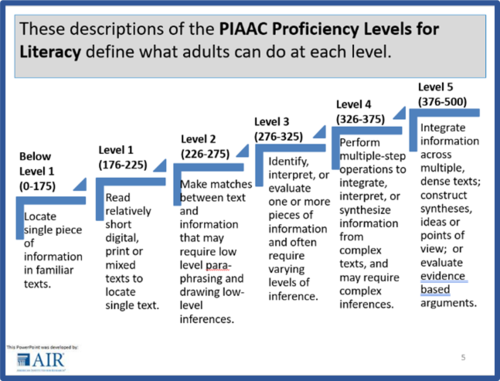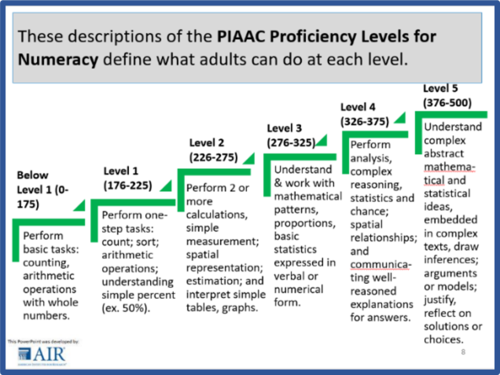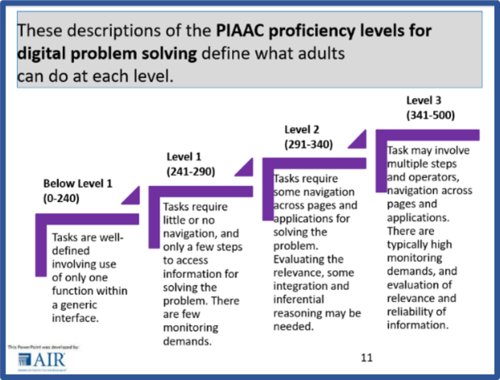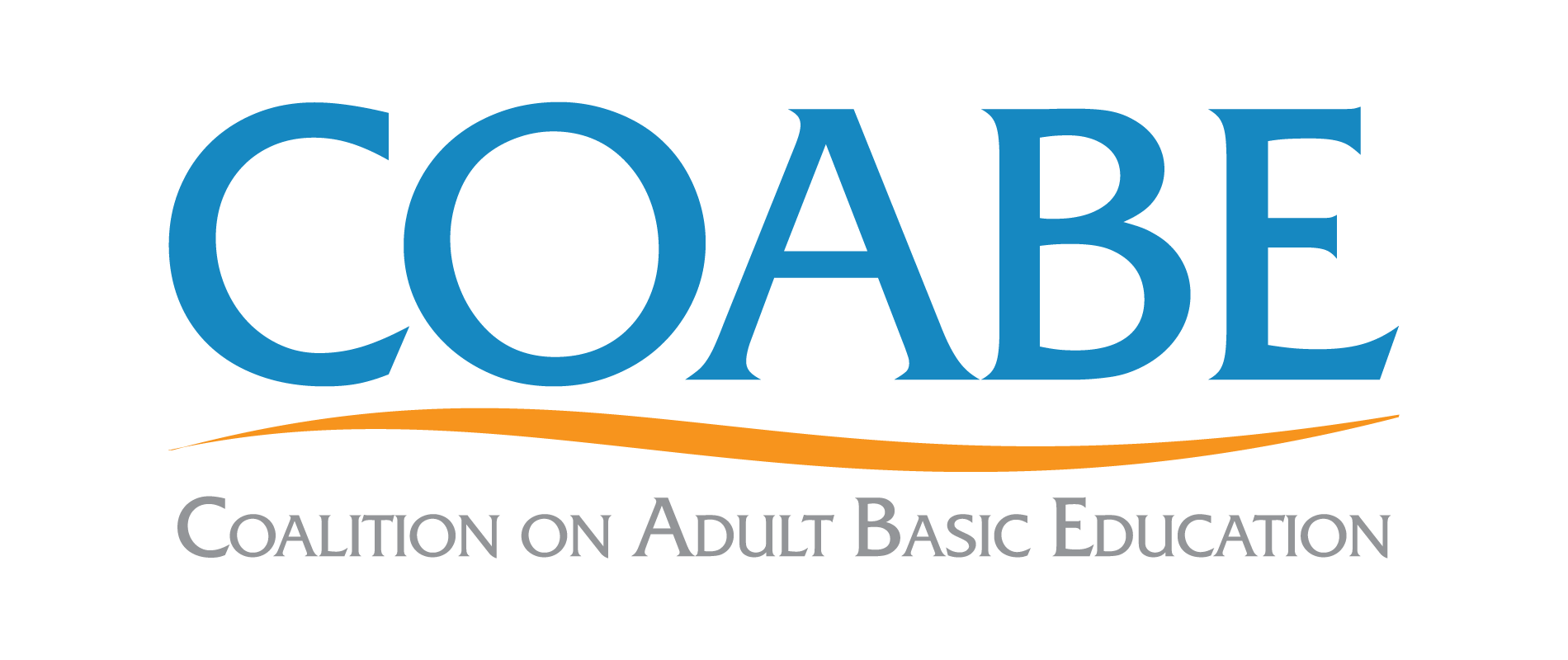Multi-Media Resources
This page was designed to provide access to all forms of the Program for the International Assessment of Adult Competencies (PIAAC) multi-media resources (videos, webinars, and PowerPoint presentations) developed by NCES, AIR, or other organizations.
General: About PIAAC |
||
|---|---|---|
| Video/Presentation | Description | Date of Publication or Dataset Used |
Watch the NCES Executive Summary Video, which presents selected findings from PIAAC 2012/2014 for the United States. |
(March 10, 2016) |
View the introductory video from the ETS/OECD PIAAC Research Conference in 2013, featuring interviews with Thomas Freidman, Andreas Schleicher, Irwin Kirsch, Angel Gurria, and others. These presentations are based on PIAAC 2012 data. |
(November 13, 2013) |
The low-skilled are more likely than others to be unemployed, have bad health, and earn much less, according to the first administration of PIAAC in 2012. Countries with greater inequality in skills proficiency also have higher income inequality. |
(November 13, 2013) |
|
Irwin S. Kirsch, Director of the Center for Global Assessment at Educational Testing Service, gives an introduction to the Program for the International Assessment of Adult Competencies (PIAAC). |
(July 17, 2013) |
|
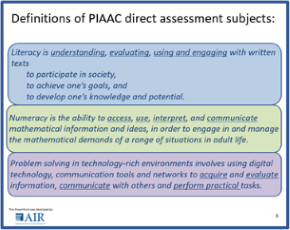 |
These presentation slides provide an introduction to PIAAC. Click on the "What is PIAAC?" thumbnail to download the presentation. Developed by the AIR-PIAAC team, this and other similar presentations on this page address issues of high interest to policymakers, administrators, educators, and practitioners. Feel free to use an entire set or a few slides from these presentations to create your own customized presentation. For more presentations go to Toolkit Presentation Slides. |
|
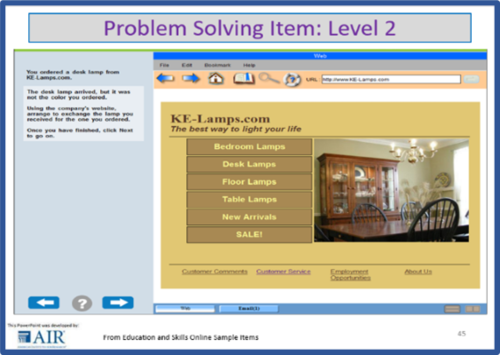 |
These presentation slides provide example of the sample tasks used in the PIAAC assessment. Click on the "Sample PIAAC Tasks" thumbnail to download the presentation. Developed by the AIR-PIAAC team, this and other similar presentations on this page address issues of high interest to policymakers, administrators, educators, and practitioners. |
|
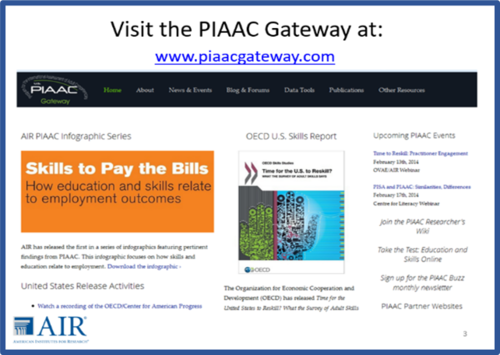 |
These presentation slides provide other resources that can be utilized to delve further into PIAAC. Click on the "Gateway & Other Resources" thumbnail to download the presentation. Developed by the AIR-PIAAC team, this and other similar presentations on this page address issues of high interest to policymakers, administrators, educators, and practitioners. |
|
This presentation by Saida Mamedova and Emily Pawlowski will explore the skill levels of the parents of school-age children in the areas of literacy, numeracy, and digital problem solving. |
(March 20, 2022) |
|
U.S. PIAAC Skills Map and Small Area Estimates |
||
|---|---|---|
| Video/Presentation | Description | Date of Publication or Dataset Used |
Presentation #1 Theme: Exploring Associations in Literacy and Numeracy Proficiency with Age and Education at the State and County Levels |
(October 2022) |
|
The PIAAC Skills Map is an interactive tool that presents state and county estimates of adult literacy and numeracy proficiency. These new data include first-of-their kind state- and county-level data on numeracy skills and greater detail about literacy skills at the state and county level. Tom Krenzke, the key expert of the U.S. PIAAC Skills Map, is a Vice President and a Senior Statistician in Westat's Statistics and Evaluation Sciences Unit. |
(September 2020) |
|
On Wednesday, August 26, 2020, AIR hosted a demonstration of the U.S. PIAAC Skills Map: State and County Indicators of Adult Literacy and Numeracy. The discussion covered the potential uses of the data from a policy and research perspective, which relates to the workforce, adult basic education, and training. Presenter: Tom Krenzke,Senior Statistician, Westat Discussant: Cheryl Keenan, OCTAE Director, U.S. Department of Education Discussant: Monica Mean, Education Research Analyst, OCTAE, U.S. Department of Education Moderator: Holly Xie, Program Officer, NCES, U.S. Department of Education |
(August 26, 2020) |
|
This promotional video introduces the U.S. PIAAC Skills Map online tool, where users can easily access the most up-to-date data on adults’ literacy and numeracy for all U.S. states and counties. The Skills Map uses combined U.S. PIAAC 2012/14/17 data. |
(June 17, 2020) |
This tutorial video provides an overview of the types of results available in the U.S. PIAAC Skills Map and how to interpret them. It also explains how to navigate through the various features and functionalities of the tool. The Skills Map uses combined U.S. PIAAC 2012/14/17 data. |
(June 17, 2020) |
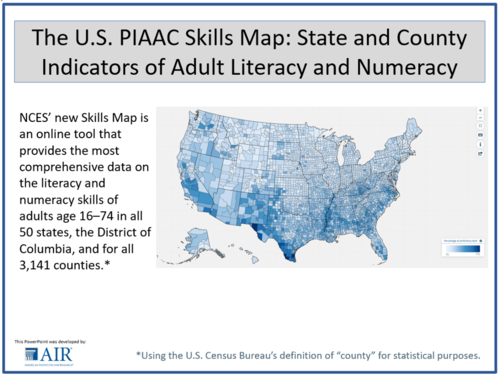 |
These presentation slides provide an overview of the functions and capabilities of the U.S. PIAAC Skills Map. Click on the "Small Area Estimates (U.S. PIAAC Skills Map)" thumbnail to download the presentation. Developed by the AIR-PIAAC team, this and other similar presentations on this page address issues of high interest to policymakers, administrators, educators, and practitioners. |
(Uses 2012/2014/2017 PIAAC Data) |
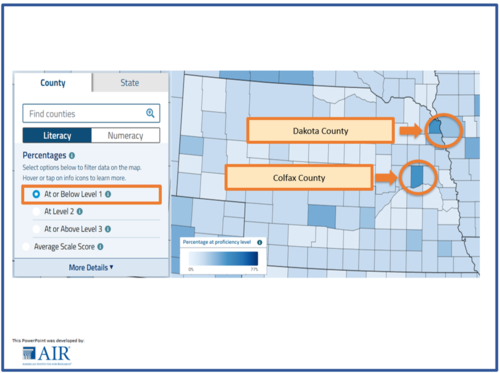 |
These presentation slides provide additional examples of how the U.S. PIAAC Skills Map can be used. Click on the "Supplemental Examples (U.S. PIAAC Skills Map)" thumbnail to download the presentation. Developed by the AIR-PIAAC team, this and other similar presentations on this page address issues of high interest to policymakers, administrators, educators, and practitioners. |
(Uses 2012/2014/2017 PIAAC Data) |
Education and Labor Market |
||
|---|---|---|
| Video/Presentation | Description | Date of Publication or Dataset Used |
This webinar highlighted the report’s findings on:
|
(April 2022) |
|
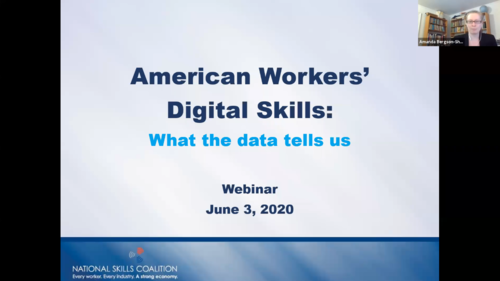 |
During this webinar, Amanda Bergson-Shilcock (NSC) and Dr. Jasmine Park (AIR) provide a detailed perspective on U.S. workers’ digital skills before the COVID-19 pandemic and discuss what PIAAC data can tell us about the new landscape of digital skills. For more information about the webinar, click here. |
(June 3, 2020) |
Jack Buckley and Ellen Scully-Russ talk about education statistics and labor markets around the world and in the U.S. They speak about U.S. labor and education statistics, workplace skills and employee demographics, and how American adults performed on PIAAC 2012 compared to their peers in other countries. |
(October 25, 2013) |
|
Tom Brokaw, Thomas Freidman, Michelle Rhee, and others talk about the development of PIAAC and the implications of the assessment for economic research and policies. |
(May 23, 2011) |
|
Skills of Young Adults |
||
|---|---|---|
| Video/Presentation | Description | Date of Publication or Dataset Used |
On February 6th, 2019, AIR hosted two presentations on the experiences and skills of young adults in the United States. The first presentation focused on the Education Longitudinal Study of 2002 (ELS:2002) to study young adult progression through high school and into young adulthood. The second presentation focused on PIAAC to discuss skills of U.S. young adults (those 16-34 at the time of the data collection) and draws on two reports written for the ETS Center for Research on Human Capital and Education. |
(February 6, 2019) |
|
On February 24, 2016, AIR hosted a presentation and discussion on the growing inequality of opportunity in the United States and the impact this has on both skills acquisition and outcomes for current and future generations. |
(February 24, 2016) |
|
Anthony Carnevale discusses U.S. PIAAC 2012 results on C-SPAN's Washington Journal. Mr. Carnavale says that, while in the past, generally only upper management needed critical thinking, problem-solving, and other higher level skills, the modern economy requires these skills from most workers. |
(October 15, 2013) |
|
Low-Skilled Adults |
||
|---|---|---|
| Video/Presentation | Description | Date of Publication or Dataset Used |
Andreas Schleicher, Director for Education & Skills at OECD, hosted a Q&A webinar on November 9, 2018 about the new report Skills on the Move: Migrants in the Survey of Adult Skills. Drawing on data from PIAAC, this report provides new evidence on differences in migrants’ characteristics and contexts and considers how these relate to the skills migrants possess. |
(November 9, 2018) |
|
On February 12, 2015, Migration Policy Institute (MPI) authors present findings from their report, Through an Immigrant Lens: PIAAC Assessment of the Competencies of Adults in the United States, based on U.S. PIAAC 2012 data. They discuss what their analysis reveals about the literacy of the first- and second-generation immigrant population in the United States, the U.S. education and workforce training system, and the implications for the future of the U.S. labor market and its role in the global economy. |
(February 12, 2015) |
|
On March 16, 2017, National Skills Coalition's Director of Upskilling Policy Amanda Bergson-Shilcock presented findings from her new report Foundational Skills in the Service Sector report which draws on PIAAC data to shed light on working adults ages 16-64 who have limited basic skills. |
(March 16, 2017) |
|
Using U.S. PIAAC 2012 data, Daphne Greenberg from Georgia State University explains the cost of low literacy in the United States, its impact on society, and what we need to do to improve adult skills. |
(November 28, 2013) |
|
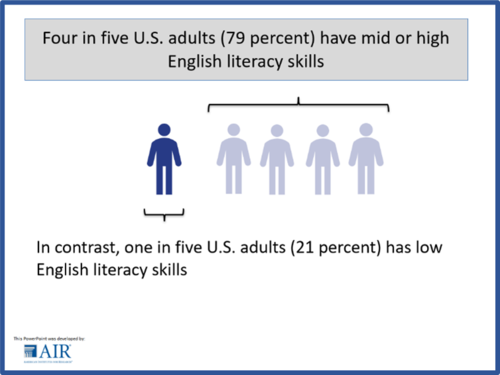 |
These presentation slides provide highlights from the NCES Adult Literacy in the United States Datapoint. Click on the "Literacy Datapoint" thumbnail to download the presentation. Developed by the AIR-PIAAC team, this and other similar presentations on this page address issues of high interest to policymakers, administrators, educators, and practitioners. |
(Uses 2012/2014 PIAAC Data) |
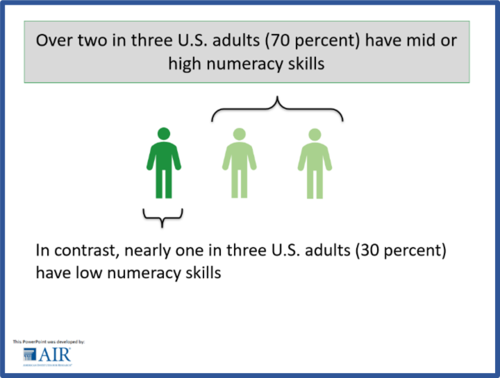 |
These presentation slides provide highlights from the NCES Adult Numeracy in the United States Datapoint. Click on the "Numeracy Datapoint" thumbnail to download the presentation. Developed by the AIR-PIAAC team, this and other similar presentations on this page address issues of high interest to policymakers, administrators, educators, and practitioners. |
(Uses 2012/2014 PIAAC Data) |
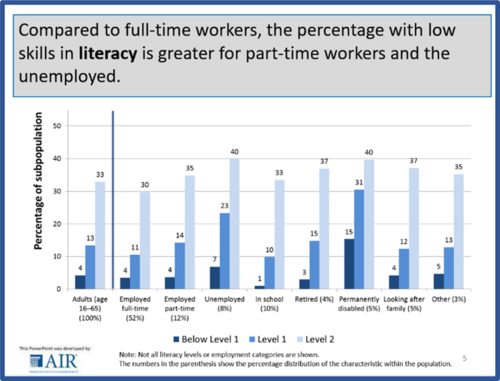 |
These presentation slides provide a closer look at working adults who scored below level 3 in literacy and where they work. Click on the "Low-Skilled Workers: Focus on Literacy" thumbnail to download the presentation. Developed by the AIR-PIAAC team, this and other similar presentations on this page address issues of high interest to policymakers, administrators, educators, and practitioners. |
(Uses 2012/2014 PIAAC Data) |
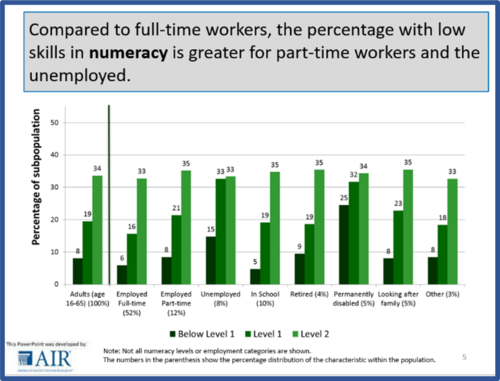 |
These presentation slides provide a closer look at working adults who scored below level 3 in numeracy and where they work. Click on the "Low-Skilled Workers: Focus on Numeracy" thumbnail to download the presentation. Developed by the AIR-PIAAC team, this and other similar presentations on this page address issues of high interest to policymakers, administrators, educators, and practitioners. |
(Uses 2012/2014 PIAAC Data) |
PIAAC Prison Study |
||
|---|---|---|
| Video/Presentation | Description | Date of Publication or Dataset Used |
On December 10, 2019, the AIR-PIAAC team held a webinar to discuss a report written by New America, entitled Equipping Individuals for Life Beyond Bars: The Promise of Higher Education & Job Training in Closing the Gap in Skills for Incarcerated Adults. Presenter: Monique O. Ositelu, Ph.D., Senior Policy Analyst, New America Discussant: Ruth Delaney, Program Manager, Vera Institute for Justice Moderator: Emily Pawlowski, Research Associate, AIR |
(December 10, 2019) |
|
On February 22, 2017, AIR hosted a presentation and discussion on the report titled Highlights from the U.S. PIAAC Survey of Incarcerated Adults: Their Skills, Work Experience, Education, and Training, which presents findings from the U.S. PIAAC 2014 Prison Study. For more information about the webinar, please visit the event page on the AIR website. |
(February 22, 2017) |
|
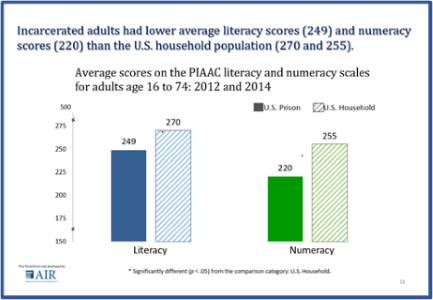 |
These presentation slides provide a summary of the U.S. PIAAC Results for incarcerated adults. Click on the "U.S. Prison Study and Overview of Results" thumbnail to download the presentation. Developed by the AIR-PIAAC team, this and other similar presentations on this page address issues of high interest to policymakers, administrators, educators, and practitioners. |
(Uses 2014 PIAAC Data) |
In this video, Mary Ann Fox and Stephen Provasnik provide opening remarks and an overview of the U.S. PIAAC Prison Study. This video was recorded as part of an event on November 15, 2016 highlighting information on the basic skills of incarcerated adults, how their skills compare with those of the U.S. household population, as well as the relationships between skills, education, job training and nonacademic experiences in prison, such as work assignments. Presenter: Mary Ann Fox, Managing Director, AIR Presenter: Stephen Provasnik, U.S. Technical Advisor for PIAAC, National Center for Education Statistics |
(November 15, 2016) |
|
Erin Alomar talks about her experience with education and training in a state correctional system. This video was recorded as part of an event on November 15, 2016 highlighting information on the basic skills of incarcerated adults, how their skills compare with those of the U.S. household population, as well as the relationships between skills, education, job training and nonacademic experiences in prison, such as work assignments. Presenter: Erin Alomar, Formerly Incarcerated in a State Correctional System |
(November 15, 2016) |
|
John Linton, John Nally, and Fred Patrick are featured in this panel presentation about the skills of the U.S. prison population. This video was recorded as part of an event on November 15, 2016 highlighting information on the basic skills of incarcerated adults, how their skills compare with those of the U.S. household population, as well as the relationships between skills, education, job training and nonacademic experiences in prison, such as work assignments. Presenter: John Linton, Former Director, Office of Correctional Education, Office of Career, Technical, & Adult Education Presenter: John Nally, State Director, Correctional Education, Indiana Presenter: Fred Patrick, Director, Center of Sentencing and Corrections, Vera Institute of Justice |
(November 15, 2016) |
|
Lois M. Davis, Stefan LoBuglio, and Steve Steurer are featured in this panel presentation about the education and training in U.S. prisons. This video was recorded as part of an event on November 15, 2016 highlighting information on the basic skills of incarcerated adults, how their skills compare with those of the U.S. household population, as well as the relationships between skills, education, job training and nonacademic experiences in prison, such as work assignments. Presenter: Lois M. Davis, Senior Policy Researcher; Professor, Pardee RAND Graduate School, RAND Corporation Presenter: Stefan LoBuglio, Director of Corrections and Reentry, National Reentry Resource Center of Council of State Government Justice Center Presenter: Steve Steurer, Former Executive Director; Consultant, Correctional Education Association; RAND Corporation |
(November 15, 2016) |
|

